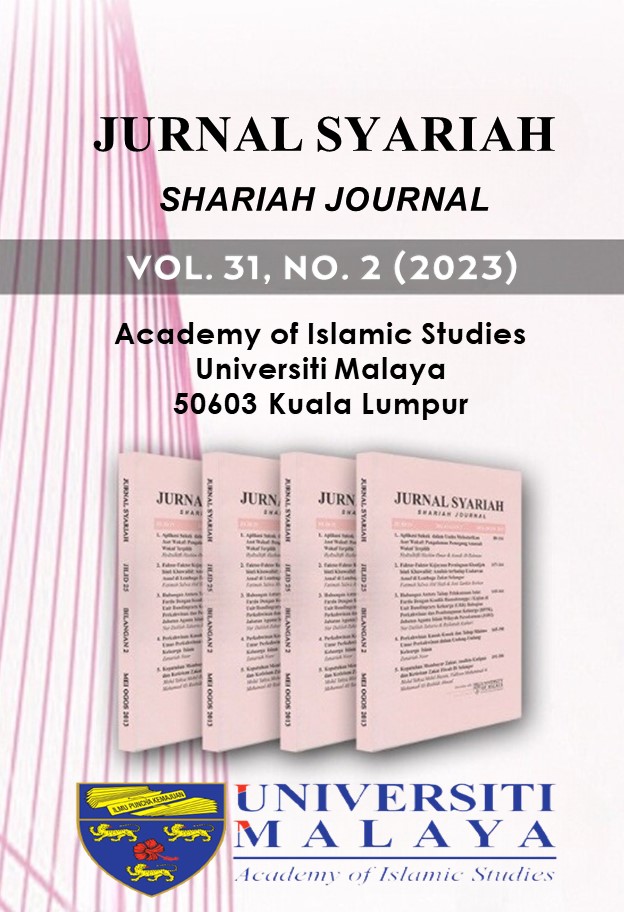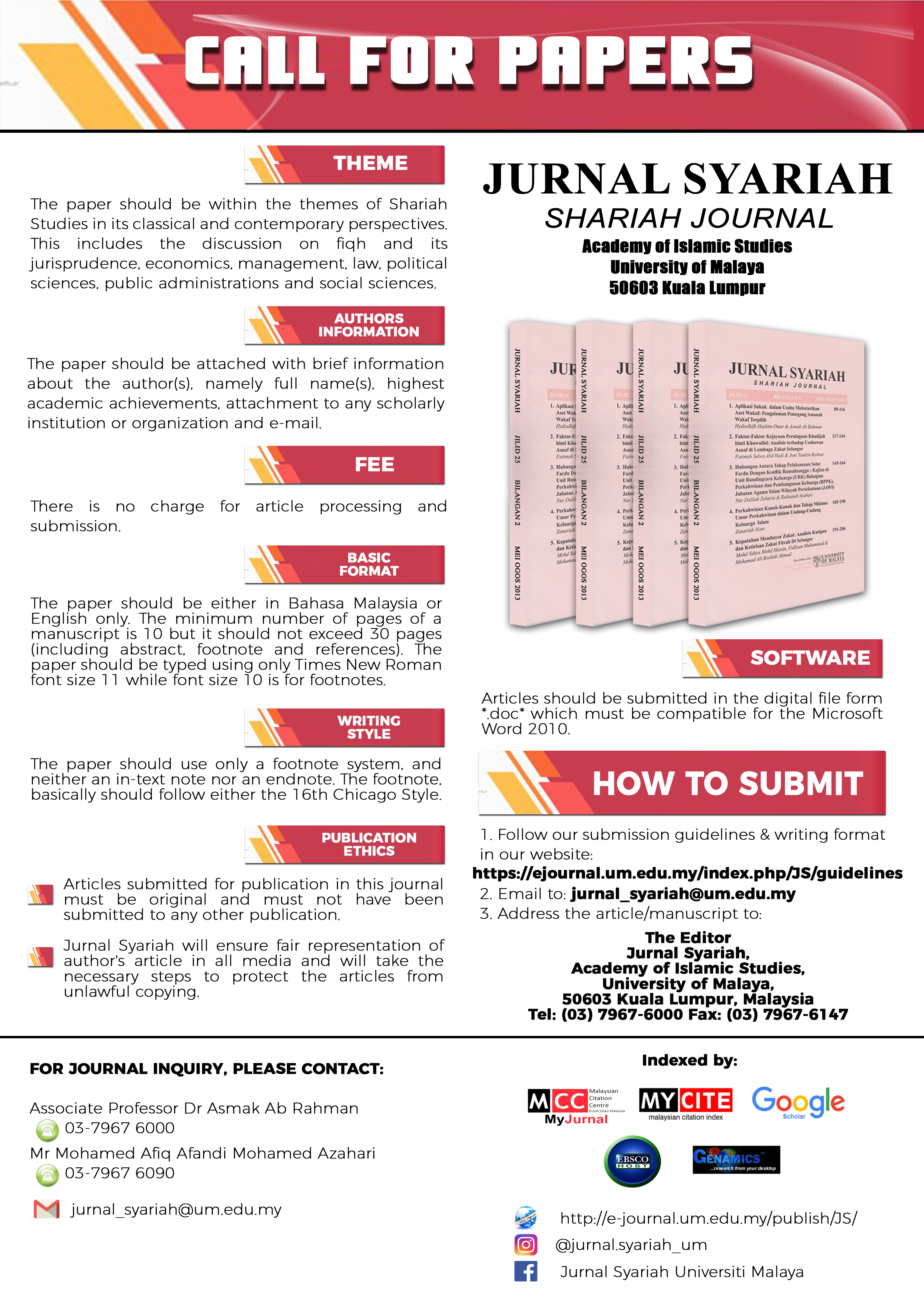THE CRITIQUE OF ALTERNATIVE DISPUTE RESOLUTION UNDER ISLAMIC LAW AND ITS RELEVANCE IN THE CONTEMPORARY NIGERIA
DOI:
https://doi.org/10.22452/syariah.vol31no2.4Keywords:
alternative dispute resolution, Sulh, Tahkim, fatwaAbstract
The practice of Alternative Disputes Resolution (ADR) such as Tahkim (arbitration), Sulh (mediation), ombudsman (Muḥtasib), expert opinion (fatwa) and other ways of compromising disputes out of court is sanctioned under Islamic law. Muslims need to know the relevance of these ADR processes and their applicability in the settlement of disputes. This is based on the authority that Allah unequivocally stated that Sulh is the best (Qur’an al-Nisa’: 128). This article offers a critique of ADR processes under Islamic law and the chances of its assimilation in Nigeria. This paper argued that the ADR processes are very significant in the administration of justice. The setback is in its application in Nigeria despite the practice of Shariah in about twelve states in Northern Nigeria. It is opined that individuals, institutions and courts have not manifestly practised ADR processes. This paper adopted a combination of doctrinal, empirical, historical and analytical research methods. We consulted primary and secondary materials, coupled with the use of questionnaires. The paper employed explorative method of data analysis. This paper revealed that the current application of Islamic ADRs is informal and unpopular as it lacks statutory backing in Nigeria. People are desirous to embracing it, which will help improve the administration of justice through the decongestion of court cases. This paper concludes that Islamic ADRs are effective for access to justice in Islam. The paper therefore recommended amongst others that Sulh should be statutorily provided for in Nigeria and adequate Islamic legal training of those involved in the administration of justice should be conducted to avoid an improper practice that will undermine its positive impact on the administration of justice in Nigeria.
Downloads
References
'Abd al-Karim Zaydan, Nizam al-Qada’ fi al-Shari‘ah al-Islamiyyah (Baghdad: Matba‘ah al-‘Ani, 1984).
Abdul Hamid El-Ahdab, Arbitration with the Arab Countries (The Netherlands: Kluwer Law International, 1990).
Abdul Hamid Siddiqi, Sahih Muslim Arabic-English, vol. 1 (Delhi: Adam Publishers, 1999).
Agatha Anulika Okeke, ‘Exploring Alternative Dispute Resolution for Settlement of Criminal Disputes in Nigeria’ (Ph.D Thesis, College of Social and Behavioral Sciences, Walden University, 2021).
Aida Othman, And Ṣulḥ is Best: Amicable Settlement and Dispute Resolution in Islamic Law (n.p.: Harvard University, 2005).
Alfa Saka (Imam Gbobi Ogele, Kwara State Nigeria), in interview with the author, 13 December 2009.
Ali Ahmad, Jummai Audi and Ibrahim N. Sada, ‘Resolution of Civil Disputes in Jigawa State Nigeria’, Access to Justice Programme-Research Report, June-August 2003, 11, https://docplayer.net/77986514-Resolution-of-civil-disputes-in-jigawa-state-nigeria.html, accessed on 10 May 2023.
Babatunde Osibanjo, ‘An Appraisal of Arbitration and Litigation Techniques as a Panacea for Fair Justice Administration under the Nigerian Legal System’, Ligitation/Dispute Resolution, 15 April 2016, https://s3.amazonaws.com/documents.lexology.com/fca1fde9-c4e0-478d-93d8-c8825b4edeb2.pdf?AWSAccessKeyId=AKIAVYILUYJ754JTDY6T&Expires=1713395776&Signature=keOo0Td8xOG4ZPim%2BXBThqn1SPg%3D, accessed on 25 January 2024.
Benjamin Balzer and Johannes Schneider, ‘Managing a Conflict: Optimal Alternative Dispute Resolution’, RAND Journal of Economics, vol. 52/2 (2021).
Emilia Onyema and Monalisa Odibo, ‘How Alternative Dispute Resolution Made a Comeback in Nigeria’s Courts’, Africa Research Institute-Understanding Africa Today, 23 Jun 2017, 5-6, https://www.africaresearchinstitute.org/newsite/publications/counterpoints/alternative-dispute-resolution-made-comeback-nigerias-courts/#:~:text=When%20the%20Lagos%20Multi%2DDoor,and%20rooted%20in%20Nigeria's%20past.
Ibrahim Barkindo, ‘The Role of Traditional Rulers in ADR - An Islamic Law Perspective’, (Paper presented at the National ADR Summit for Traditional Rulers, Asaa Pyramid Hotel, Kaduna, 6-7 October 2009), https://www.scribd.com/doc/24011864/The-Role-of-Traditional-Rulers-in-ADR-An-Islamic-Law-Perspective, accessed on 19 December 2023.
Igwe Onyebuchi Igwe, Kevin Onwuka Udude and Ogah Chinyere Constance, ‘A Review of Continuous Relevance of the Traditional Methods of Dispute Resolution Mechanism in Southeast of Nigeria’, Beijing Law Review, vol. 11/1 (2020).
Martin Sokefeld, Spaces of Conflict in Everyday Life, Perspective Across Asia, 1st ed. (New York: Columbia University Press, 2015).
Muhammad Akram Khan, ‘Al-Hisba and the Islamic Economy’, in Public Duties in Islam: The Institution of the Hisba, Ahmad Ibn ‘Abd al-Halim Ibn Taymiyah, ed. Muhtar Holland and Khurshid Ahmad, trans. Muhtar Holland (Leicester: The Islamic Foundation, 1982).
Muhammad Akram Khan, An Intrduction to Islamic Economics (Islamabad: The International Institute of Islamic Thought, 1994).
Muhammad Mushin Khan, Translation of the Meanings of Sahih al-Bukhari, vol. 3, 5th ed., (New Delhi: Kitab Bhavan, 1984).
Muhammed S. O (Qadi, Shari’ah Court of Appeal, Ilorin Kwara State Nigeria) in interview with the author, 1 December 2009.
Mushtaq Ahmad, Business Ethics in Islam (Pakistan: The International Institute of Islamic Thought, 1995).
Norjihan Ab Aziz and Nasimah Hussin, ‘The Application of Mediation (Sulh) in Islamic Criminal Law’, Shariah Journal, vol. 24/1 (2016).
Oyeniyi Ajigboye, ‘The Concept of Multi-Door Courthouse in Nigeria: Rethinking Frank Sander’s Concept’, SSRN, 16 November 2014, https://ssrn.com/abstract=2525677 or http://dx.doi.org/10.2139/ssrn.2525677
Roger Blench, Selbut Longtau, Umar Hassan and Martin Walsh, ‘The Role of Traditional Rulers in Conflict Prevention and Mediation Nigeria’, (Prepared for the United Kingdom’s Department for International Development (DFID), Nigeria, 9 November 2006).
Rufa’i Sulaiman Abubakar and Atikullah Hj Abdullah, ‘The Roles of Hisbah Commission and its Challenges in the Zamfara State of Nigeria’, International Journal of Academic Research in Business and Social Sciences, vol. 11/9 (2021), https://www.researchgate.net/publication/355149435_The_Roles_of_Hisbah_Commission_and_its_Challenges_in_the_Zamfara_State_of_Nigeria, accessed on 19 December 2023
Sayyid Sabiq, Fiqh al-Sunnah, vol. 3 (Qahirah: Dar al-Fath li al-I‘lam al-‘Arabi, 2000).
Section 19 (d) of the Constitution of the Federal Republic of Nigeria, 1999 (as amended).
Section 61 of the Area Courts Edict, 1967 Central-West State of Nigeria Gazette No. 7, vol. 1, 21st December 1967-Supplement.
Stephen B. Goldberg, Frank E. A Sander, Nancy H. Rogers and Rudolph Cole, Dispute Resolution: Negotiation Mediation and Other Process, 3rd ed. (New York: Wolters Kluwer, 1999).
Syed Khalid Rashid, Alternative Dispute Resolution in Malaysia (Kuala Lumpur: Kulliyyah of Laws, IIUM, 2000).
Syed Khalid Rashid, Alternative Dispute Resolution: The Emerging New Trend of Informal Justice (Gombak: International Islamic University Malaysia, 2006).
Sheikh Burhanuddin Abi Al Hasan Ali Marghinani, The Hedaya Commentary on the Islamic Laws, trans. Charles Hamilton (Pakistan: Darul-Ishaat, 2005).
Wahbah al-Zuhayli, al-Fiqh al-Islami wa Adillatuh, vol. 6, 3rd ed. (Dimashq: Dar al-Fikr, 1989).
Downloads
Published
How to Cite
Issue
Section
License
Copyright (c) 2023 Jurnal Syariah

This work is licensed under a Creative Commons Attribution-NonCommercial 4.0 International License.
COPYRIGHT: All rights reserved. Not allowed to be reproduced any part of articles and contents of this journal in any form or by any way, whether electronic, mechanical, photocopying, recording or otherwise without permission in writing from the Chief Editor, Jurnal Syariah.



















